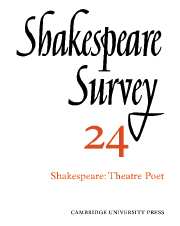Book contents
- Frontmatter
- Hearing Shakespeare: Sound and Meaning in ‘Antony and Cleopatra’
- ‘More Pregnantly Than Words’: Some Uses and Limitations of Visual Symbolism
- Shakespeare and the Limits of Language
- Revenge, Retribution, and Reconciliation
- Shakespeare the Professional
- Shakespeare’s Talking Animals
- The Morality of ‘Love’s Labour’s Lost’
- Shakespeare’s ‘Earth-treading Stars’: the Image of the Masque in ‘Romeo and Juliet’
- ‘Hamlet’ and the ‘Sparing Discoverie’
- ‘Hamlet’ in France 200 Years Ago
- The Hamlet in Henry Adams
- ‘Pericles’ and the Dream of Immortality
- A Necessary Theatre: The Royal Shakespeare Season 1970 Reviewed
- Free Shakespeare
- The Year's Contributions to Shakespearian Study 1 Critical Studies
- 2 Shakespeare’s Life, Times, and Stage
- 3 Textual Studies
- Index
- Plate section
2 - Shakespeare’s Life, Times, and Stage
Published online by Cambridge University Press: 28 March 2007
- Frontmatter
- Hearing Shakespeare: Sound and Meaning in ‘Antony and Cleopatra’
- ‘More Pregnantly Than Words’: Some Uses and Limitations of Visual Symbolism
- Shakespeare and the Limits of Language
- Revenge, Retribution, and Reconciliation
- Shakespeare the Professional
- Shakespeare’s Talking Animals
- The Morality of ‘Love’s Labour’s Lost’
- Shakespeare’s ‘Earth-treading Stars’: the Image of the Masque in ‘Romeo and Juliet’
- ‘Hamlet’ and the ‘Sparing Discoverie’
- ‘Hamlet’ in France 200 Years Ago
- The Hamlet in Henry Adams
- ‘Pericles’ and the Dream of Immortality
- A Necessary Theatre: The Royal Shakespeare Season 1970 Reviewed
- Free Shakespeare
- The Year's Contributions to Shakespearian Study 1 Critical Studies
- 2 Shakespeare’s Life, Times, and Stage
- 3 Textual Studies
- Index
- Plate section
Summary
Innumerable insights into the personality and private life of the world’s foremost playwright have, it seems, long lain readily available to us had we but viewed that riddling perspective, his sonnets, aright, perceiving there not one face but two – the authentic features of the dramatist side by side with those of ‘his patron, his companion in a turbulent love affair, his correspondent in the sonnets, and the woman who influenced him throughout his creative life’, the Countess of Southampton. Seen, as Elizabeth Beach would have us see them, as a kind of verse dialogue between Shakespeare and his equally gifted patroness, the Sonnets cease to be problematic, Shakespeare’s sexual reputation is vindicated, and we are presented with a treasure-house of knowledge about the bard and his beloved. Unfortunately the reviewer lacked the necessary faith in Lady Mary’s creative ability to pass into this biographical wonderland. More conventional means of plucking out the heart of the mystery have been employed in Donald Neil Friesner’s ‘William Shakespeare, Conservative’. Friesner ponders the dramatist’s social background, his firm links with Stratford, and the political philosophy of the plays, and postulates a Shakespeare conservative by temperament and conviction. The limitations of this particular deductive method are self- evident – attitudes are not necessarily determined by social origin nor do the plays lend themselves to easy categorisation. The detective endeavours of both Beach and Friesner pale however beside the dazzling ingenuity of B. N. De Luna’s The Queen Declined, an interpretation of Willobie His Avisa together with a text of the original edition.
- Type
- Chapter
- Information
- Shakespeare Survey , pp. 154 - 169Publisher: Cambridge University PressPrint publication year: 1971



